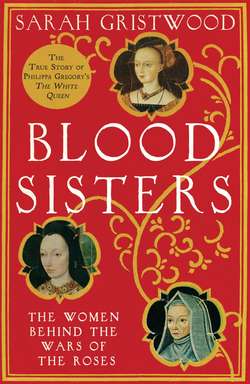Читать книгу Blood Sisters: The Hidden Lives of the Women Behind the Wars of the Roses - Sarah Gristwood - Страница 20
EIGHT Fortune’s Pageant
ОглавлениеAnd, being a woman, I will not be slack
To play my part in Fortune’s pageant.
Henry VI Part 2, 1.2
In April 1462 the last queen, the deposed Marguerite, had made her way from Scotland to France; a register of the city of Rouen, published in July, describes her a few months afterwards being received ‘with much honour, by the gentlemen of the King’s suite’, and lodging in the house of a Rouen lawyer. Since the previous year she had been using her old admirer Pierre de Brezé to negotiate a loan and a fleet with which to seize the Channel Islands as a bridgehead from France to England: ‘If the Queen’s intentions were discovered, her friends would unite with her enemies to kill her,’ de Brezé said. Foreseeing ‘good winnings’, the French king Louis (possibly under pressure from his mother, Marguerite’s aunt) did eventually give her aid, with Marguerite, in a gesture which would have horrified her English subjects, promising to cede him Calais in return. In the autumn of 1462 she had sailed back to Scotland, bringing forty ships and eight hundred soldiers provided by the French king and under de Brezé’s command. Collecting some Scots led by Somerset (and nominally by the deposed Henry VI), she pushed across the border into northern England where she made ‘open war’, as the Great Chronicle of London put it.
Her campaign was unsuccessful. When the Yorkist guns on England’s northern coast were trained upon her she was forced to turn tail: ‘And in a carvel, wherein was the substance of her goods, she fled; and as she sailed there came upon her such a tempest that she was fain to leave the carvel and take a fisher’s boat, and so went a-land to Berwick; and the said carvel and goods were drowned.’ Edward himself rode north to confront her; but the next spring, as Gregory’s Chronicle describes it, she was still fighting on in the north.
In the summer of 1463 there took place one of the few episodes from these wars which have been converted into story. The Duke of Burgundy’s official historian Georges Chastellain may have heard the gist of it from Marguerite herself only a few months later – but Chastellain was a poet and rhetorician as much as a chronicler, for whom the message may have been more important than the facts. As Marguerite and her party were fleeing back towards Bamburgh, so the story runs, she and her son were separated from their followers. Suddenly a band of robbers leaped out of the bushes, seized the baggage, tore the jewels from around her neck and dragged her before their leader. He had drawn his sword to cut her throat when she threw herself on her knees and implored him not to disfigure her body past recognition, for, as she said: ‘I am the daughter and wife of a king, and was in past times recognized by yourselves as your queen.’ In the best tradition of monster-taming myth, the man, known as Black Jack, in turn fell on his knees before her and then led her and her son to a secret cave in Deepden Woods, where she sheltered until de Brezé found her.7
